The cognitive network market is anticipated to grow from USD 3.8 billion in 2025 to USD 34.9 billion by 2035, with a projected CAGR of 25.0%. Over the first half-decade, growth is driven by the increasing integration of AI, machine learning, and IoT within network systems to enhance operational efficiency and automate network management. The cognitive network market is expected to witness strong demand from telecommunications and enterprise sectors, where the need for intelligent, self-optimizing networks is paramount.
The widespread adoption of 5G networks and the explosion of data traffic are significant factors driving the need for adaptive cognitive networks. Enterprises are prioritizing solutions that can optimize bandwidth allocation, reduce network congestion, and proactively detect and mitigate performance issues in real-time. As industries such as healthcare, finance, and manufacturing increasingly rely on advanced data analytics and automation, cognitive networking technologies are being implemented to enhance decision-making and predictive analytics capabilities. By 2030, the market will continue to expand rapidly, driven by the development of next-generation cognitive solutions, which will support dynamic, automated, and efficient networking ecosystems. The anticipated market growth is further supported by the ongoing shift toward cloud-based solutions and edge computing, enabling faster and more efficient data processing at the network's edge. This half-decade weighted growth reflects the accelerating adoption of cognitive technologies and their expanding role in transforming network infrastructures across industries.
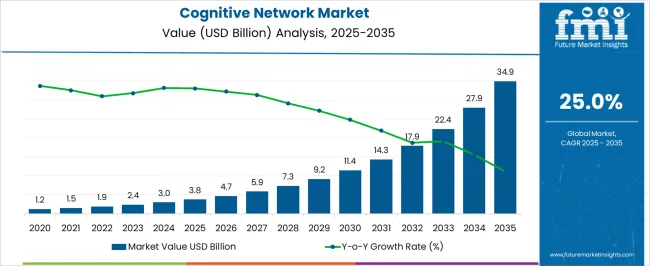
| Metric | Value |
|---|---|
| Cognitive Network Market Estimated Value in (2025 E) | USD 3.8 billion |
| Cognitive Network Market Forecast Value in (2035 F) | USD 34.9 billion |
| Forecast CAGR (2025 to 2035) | 25.0% |
The cognitive network market is strongly shaped by five interconnected parent markets, each contributing to overall demand and growth. The telecommunications and network management market holds the largest share at 40%, driven by the need for automated, self-optimizing networks that improve efficiency and reduce human intervention. As telecom providers face rising data traffic and increased demand for faster, more reliable services, the integration of cognitive networking solutions is crucial to ensure seamless operations.
The enterprise IT and cloud computing market contributes 25%, with businesses adopting cognitive networks to enhance data processing, optimize bandwidth, and ensure the efficient functioning of their cloud infrastructure. The artificial intelligence and machine learning market accounts for 15%, as cognitive network solutions increasingly leverage AI algorithms to predict and mitigate network issues in real-time. The IoT market holds a 10% share, with IoT devices driving the need for adaptive networks capable of handling large volumes of data and ensuring connectivity across devices.
The cybersecurity market represents 10%, where cognitive networking technologies help detect and counteract potential network vulnerabilities, ensuring robust data protection. Collectively, the telecommunications, enterprise IT, and AI markets account for 80% of the overall demand, highlighting that network optimization, automation, and data-driven intelligence are the primary growth drivers, while IoT and cybersecurity applications offer complementary opportunities for market expansion globally.
The cognitive network market is expanding steadily, driven by the growing need for intelligent, adaptive, and self-optimizing networks that enhance operational efficiency and reduce downtime. Increasing data traffic volumes, coupled with the proliferation of IoT devices, are encouraging enterprises to adopt AI-powered network management solutions.
Cognitive networks leverage advanced analytics, automation, and machine learning to proactively detect, predict, and mitigate network issues, improving service quality and security. The demand is further supported by enterprise digital transformation initiatives and the integration of edge computing, which require agile and resilient networking infrastructures.
As industries move toward autonomous and context-aware systems, cognitive networking solutions are becoming integral to both operational continuity and competitive advantage, ensuring scalability and adaptability in dynamic digital environments.
The cognitive network market is segmented by component, technology, deployment mode, network type, end-user, and geographic regions. By component, cognitive network market is divided into Solution and Services. In terms of technology, cognitive network market is classified into Machine Learning, NLP, Deep Learning, and Big Data Analytics. Based on deployment mode, cognitive network market is segmented into On-Premises and Cloud. By network type, cognitive network market is segmented into Telecom Networks, Enterprise Networks, Data Center Networks, and Internet of Things (IoT) Networks. By end-user, cognitive network market is segmented into Telecommunications, Healthcare, Manufacturing, Retail, BFSI, and Others. Regionally, the cognitive network industry is classified into North America, Latin America, Western Europe, Eastern Europe, Balkan & Baltic Countries, Russia & Belarus, Central Asia, East Asia, South Asia & Pacific, and the Middle East & Africa.
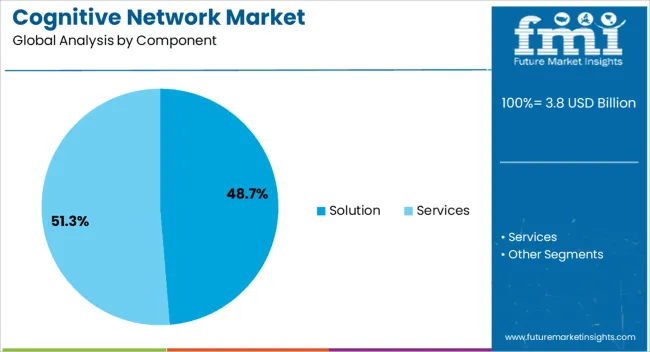
The solution segment is anticipated to account for 48.70% of the total market revenue by 2025, making it the leading component category. This dominance is attributed to the ability of solution offerings to integrate seamlessly with existing infrastructures, providing centralized control, intelligent traffic management, and automated decision-making capabilities.
Organizations are prioritizing comprehensive solutions that combine network monitoring, analytics, and optimization tools into a unified platform, reducing operational complexities.
Additionally, solutions enable faster deployment of AI-driven features, scalability across diverse environments, and long-term cost efficiencies, solidifying their position as the preferred choice for cognitive network adoption.
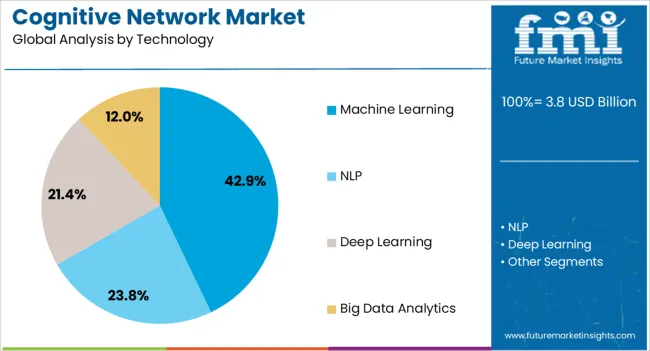
The machine learning segment is projected to represent 42.90% of market revenue by 2025 within the technology category, positioning it as the most influential technological driver. Machine learning algorithms enable cognitive networks to identify patterns, predict potential failures, and automatically adjust configurations in real time.
This capability significantly enhances network performance, minimizes outages, and strengthens security posture through anomaly detection.
Continuous advancements in supervised and unsupervised learning techniques are expanding the scope of automation, driving higher adoption rates among industries that demand high reliability and predictive capabilities.
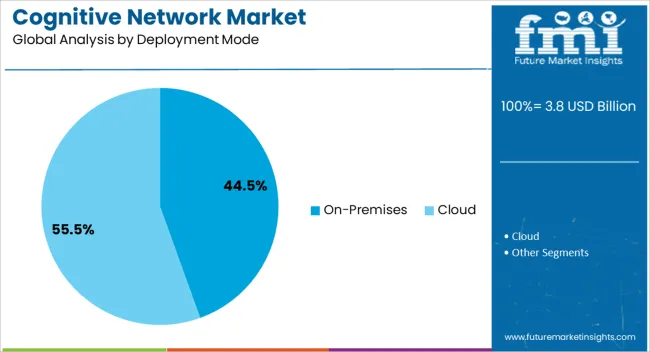
The on-premises segment is expected to contribute 44.50% of total market revenue by 2025, making it the leading deployment mode. This preference is largely driven by enterprises prioritizing data security, regulatory compliance, and direct control over network infrastructure.
On-premises deployments allow organizations to customize network operations to specific business needs while maintaining stringent data governance standards.
Industries handling sensitive information, such as banking, healthcare, and defense, continue to favor this mode for its reliability, reduced latency, and full operational control, ensuring consistent performance and compliance adherence.
Cognitive networks are revolutionizing network management by incorporating automation, AI, and IoT integration. These technologies enhance network efficiency, security, and scalability, supporting industries with increasingly complex data demands.
The growing complexity of networks, driven by increasing data volumes and device connectivity, is pushing enterprises to adopt cognitive network solutions. The need for self-optimizing, automated systems is crucial for businesses in telecommunications, enterprise IT, and cloud computing sectors to minimize human intervention and reduce operational costs. Cognitive networks automatically adjust network performance based on real-time data, ensuring efficient bandwidth usage, optimal performance, and rapid fault detection. As organizations move to integrate 5G and other next-gen networking technologies, cognitive solutions become essential for handling network traffic, ensuring higher reliability and faster response times. Automation of these processes also helps reduce downtime and improve network resilience.
Cognitive networks are increasingly incorporating AI and machine learning algorithms to improve decision-making processes. By analyzing massive amounts of real-time data, cognitive networks can identify patterns, predict network issues, and initiate proactive fixes. Machine learning allows networks to continuously learn from past events, improving performance and reliability over time. AI-powered systems can optimize network resources by dynamically adjusting bandwidth and rerouting traffic, based on usage patterns and demand. The integration of AI also enables cognitive networks to scale, meeting growing demands from industries such as telecommunications, healthcare, and finance. This enhances decision-making accuracy and minimizes human intervention, leading to a more intelligent and adaptable network.
The massive expansion of IoT devices and the increased need for edge computing drive the demand for cognitive networks. These networks are critical for efficiently managing the vast amounts of data generated by IoT devices, enabling real-time processing and decision-making at the edge. Cognitive networks can dynamically adapt to traffic patterns, ensuring that IoT devices remain connected and that data is efficiently processed. Edge computing, paired with cognitive networks, enables faster data transfer, minimizing latency and improving user experience. These solutions are particularly important for industries such as manufacturing, smart cities, and transportation, where real-time data analysis and decision-making are critical.
Cognitive networks also offer enhanced security features that are essential for protecting data and managing risk in modern network infrastructures. With the increasing frequency of cyberattacks, cognitive networks use real-time data analytics to identify potential vulnerabilities and implement corrective actions before issues escalate. These networks can detect anomalous patterns of behavior, automatically initiating security protocols to mitigate risks such as unauthorized access, data breaches, and DDoS attacks. By continuously monitoring network activity, cognitive systems also enable continuous adaptation to emerging threats, offering more resilient and secure network environments. Security becomes a core feature of cognitive networks, ensuring data protection without compromising performance.
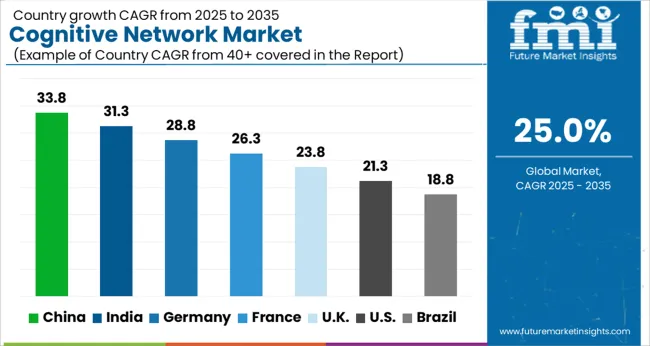
| Country | CAGR |
|---|---|
| China | 33.8% |
| India | 31.3% |
| Germany | 28.8% |
| France | 26.3% |
| UK | 23.8% |
| USA | 21.3% |
| Brazil | 18.8% |
The global cognitive network market is projected to grow at a CAGR of 25.0% from 2025 to 2035. China leads with 33.8%, followed by India (31.3%), Germany (28.8%), the UK (23.8%), and the USA (21.3%). Growth is driven by the increasing complexity of network systems, the growing demand for automation, and the integration of AI and machine learning for real-time decision-making and optimization. China and India are seeing high adoption due to expanding digital infrastructure, mobile networks, and IoT applications, while Germany, the UK, and the USA focus on enhancing enterprise IT systems, network security, and cloud computing. Global demand for cognitive networking solutions is also bolstered by sectors such as telecommunications, finance, healthcare, and manufacturing, all requiring seamless and intelligent network management. The analysis includes over 40+ countries, with the leading markets detailed below.
The cognitive network market in China is projected to grow at a CAGR of 33.8% from 2025 to 2035, fueled by the nation’s rapid digital transformation and adoption of advanced AI, IoT, and 5G technologies. The demand for cognitive networks is being driven by the need for efficient, real-time decision-making and network optimization in industries such as telecommunications, manufacturing, and healthcare. Telecom operators are upgrading their infrastructures to integrate AI for predictive maintenance and performance enhancement, while manufacturing facilities are adopting smart automation solutions. China’s commitment to creating smart cities and furthering AI research also contributes to the acceleration of cognitive network deployment. As the country pushes forward with digital transformation, it remains at the forefront of developing next-gen cognitive networks to enhance automation and data management efficiency.
The cognitive network market in India is expected to grow at a CAGR of 31.3% from 2025 to 2035, supported by increased investment in digital infrastructure and the expansion of the telecom and IT sectors. The rise in AI, IoT, and cloud computing adoption is driving the need for more efficient, data-driven network solutions. India’s telecom operators are focusing on enhancing their networks with AI-powered predictive analytics, improving maintenance operations and service quality. Additionally, rapid urbanization and the government’s push for smart city development are driving the demand for cognitive network technologies. E-commerce, fintech, and healthcare industries are also rapidly adopting these solutions to improve operational efficiency. The wide availability of affordable smartphones has further encouraged the integration of cognitive networks in rural and urban areas.
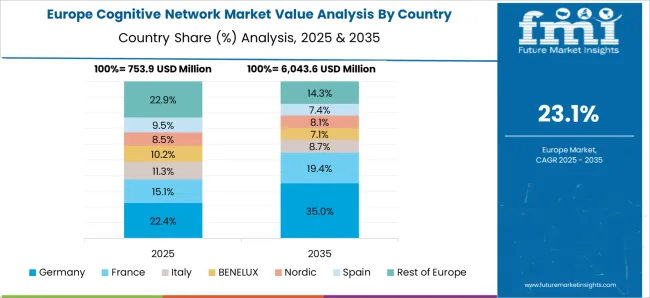
The cognitive network market in Germany is projected to experience a CAGR of 28.8% from 2025 to 2035, driven by the country’s emphasis on Industry 4.0 and smart manufacturing. German manufacturers are adopting cognitive network solutions to optimize automation and improve operational efficiency in industrial production. The demand for cognitive network solutions is also growing within the automotive, energy, and healthcare sectors, where data-driven decision-making, predictive maintenance, and real-time analytics are critical. The German government’s focus on digitalizing industries and integrating smart infrastructure is another factor contributing to the market’s growth. Moreover, the country’s strong emphasis on data security and regulatory compliance supports the adoption of cognitive network technologies.
The cognitive network market in the UK is expected to grow at a CAGR of 23.8% from 2025 to 2035, driven by rising demand in telecommunications, finance, and public sector industries. The UK is focusing on AI and machine learning for real-time data processing and improved decision-making across critical sectors. Telecom operators are upgrading their networks to offer AI-driven predictive maintenance and performance optimization. The UK government is also supporting the integration of cognitive networks in smart city projects, aiming to enhance urban mobility, safety, and efficiency. The growing need for secure, data-driven solutions in finance and healthcare further fuels market demand.
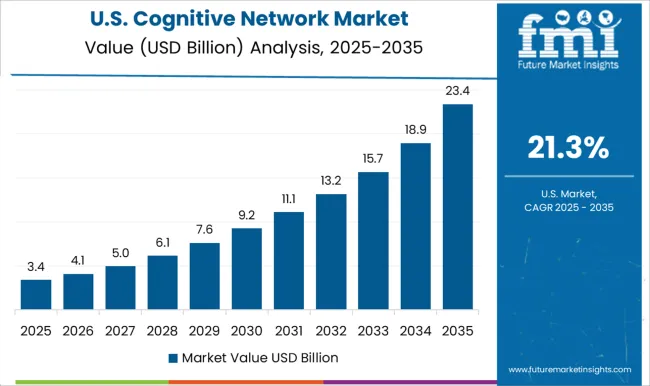
The cognitive network market in the USA is anticipated to grow at a CAGR of 21.3% from 2025 to 2035, with strong growth in sectors such as telecommunications, healthcare, and finance. The USA is home to numerous leading tech companies and telecom providers, all of whom are increasingly adopting cognitive network technologies to enhance service quality and operational efficiency. The demand for AI, machine learning, and data analytics to optimize network performance and support decision-making is increasing in both the private and public sectors. Additionally, investments in 5G infrastructure and smart city initiatives further drive the adoption of cognitive network technologies across urban and rural areas.
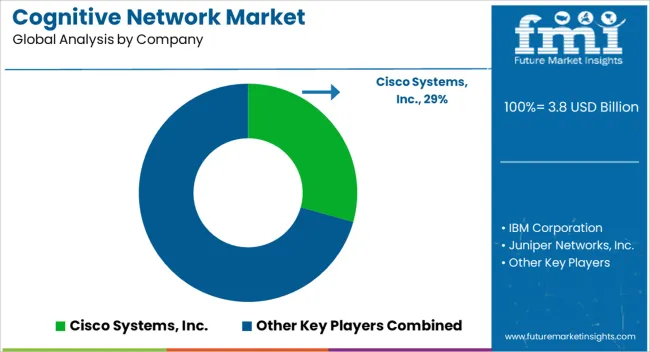
The cognitive network market is highly competitive, driven by major networking companies, telecom equipment vendors, and AI-focused software providers striving to deliver intelligent and adaptive network solutions. Prominent players such as IBM, Cisco, Juniper Networks, Nokia, Huawei, and Ericsson compete by integrating machine learning, data analytics, and automation into their network management platforms. Their strategies focus on delivering real-time network optimization, predictive maintenance, and automated fault resolution, which are crucial for handling increasing network complexity and traffic loads.
Competition is shaped by the ability to offer scalable and secure platforms compatible with multi-vendor environments. Large companies leverage their extensive infrastructure portfolios and global service networks to bundle cognitive capabilities with existing hardware and software solutions. Smaller and niche players focus on specialized AI-driven analytics tools or network orchestration solutions to capture targeted segments such as enterprise data centers, 5G networks, and cloud service providers. Partnerships with telecom operators, cloud hyperscalers, and managed service providers are commonly used to strengthen market penetration.
| Item | Value |
|---|---|
| Quantitative Units | USD 3.8 Billion |
| Component | Solution and Services |
| Technology | Machine Learning, NLP, Deep Learning, and Big Data Analytics |
| Deployment Mode | On-Premises and Cloud |
| Network Type | Telecom Networks, Enterprise Networks, Data Center Networks, and Internet of Things (IoT) Networks |
| End-user | Telecommunications, Healthcare, Manufacturing, Retail, BFSI, and Others |
| Regions Covered | North America, Europe, Asia-Pacific, Latin America, Middle East & Africa |
| Country Covered | United States, Canada, Germany, France, United Kingdom, China, Japan, India, Brazil, South Africa |
| Key Companies Profiled | Cisco Systems, Inc., IBM Corporation, Juniper Networks, Inc., Nokia Corporation, VMware, Inc., Arista Networks, Inc., and Ericsson |
| Additional Attributes | Dollar sales projections for 2025 and 2035, market share across regions, competitive landscape, adoption rates, technological advancements, and trends driving demand. |
The global cognitive network market is estimated to be valued at USD 3.8 billion in 2025.
The market size for the cognitive network market is projected to reach USD 34.9 billion by 2035.
The cognitive network market is expected to grow at a 25.0% CAGR between 2025 and 2035.
The key product types in cognitive network market are solution, _network management, _security management, _sla management, services, _professional services and _managed services.
In terms of technology, machine learning segment to command 42.9% share in the cognitive network market in 2025.






Full Research Suite comprises of:
Market outlook & trends analysis
Interviews & case studies
Strategic recommendations
Vendor profiles & capabilities analysis
5-year forecasts
8 regions and 60+ country-level data splits
Market segment data splits
12 months of continuous data updates
DELIVERED AS:
PDF EXCEL ONLINE
Cognitive Supply Chain Market Forecast Outlook 2025 to 2035
Cognitive Computing Market Size and Share Forecast Outlook 2025 to 2035
Cognitive Impairment Biomarkers Market Size and Share Forecast Outlook 2025 to 2035
Cognitive Electronic Warfare Market Size and Share Forecast Outlook 2025 to 2035
Cognitive Agents Market Size and Share Forecast Outlook 2025 to 2035
Cognitive Analytics Market Size and Share Forecast Outlook 2025 to 2035
Cognitive Diagnostics Market Analysis & Forecast by Diagnosis, Indication, End User and Region through 2035
Cognitive health supplements market analysis by product type, form, sales channel, functionality, and by region – Growth, trends, and Forecast from 2025 to 2035
Cognitive Neuroscience Market Overview – Trends & Research Insights 2024-2034
Cognitive Assessment and Training Market Report – Trends & Growth Forecast 2024-2034
Cognitive Data Management Market
Cognitive Security Market
Cognitive Systems Spending Market Report – Growth & Forecast 2016-2026
Content Analytics Discovery And Cognitive Systems Market Size and Share Forecast Outlook 2025 to 2035
Content Analytics, Discovery, and Cognitive Software Market Analysis by Product Type, End User, and Region through 2035
Network Simulator Software Market Size and Share Forecast Outlook 2025 to 2035
Network Connectivity Tester Market Size and Share Forecast Outlook 2025 to 2035
Network Analyzers Market Size and Share Forecast Outlook 2025 to 2035
Network as a Service (NaaS) Market Size and Share Forecast Outlook 2025 to 2035
Network Analytics Market Size and Share Forecast Outlook 2025 to 2035

Thank you!
You will receive an email from our Business Development Manager. Please be sure to check your SPAM/JUNK folder too.
Chat With
MaRIA